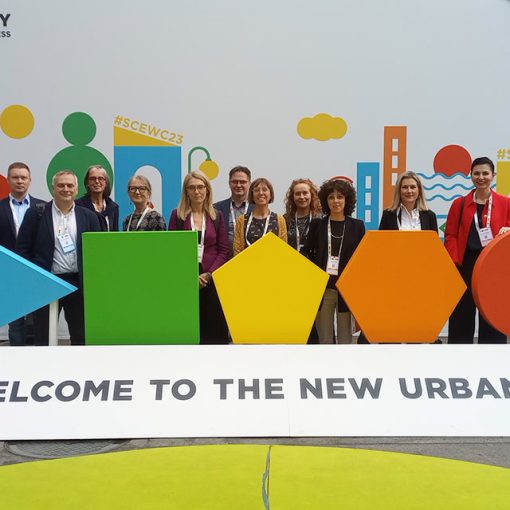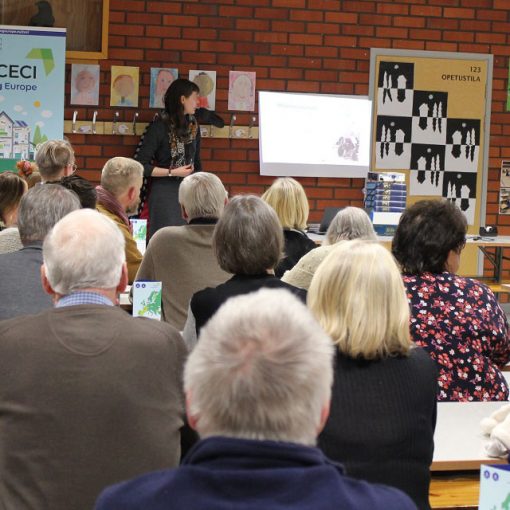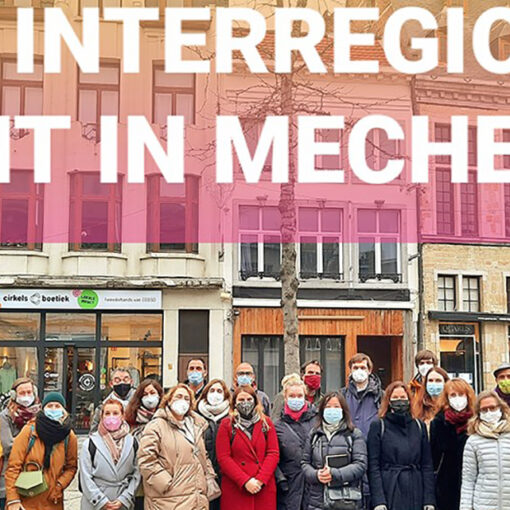Worldwide, more than 2.2 billion people experience difficulties with either near or far vision, and about 64% of adults use glasses, contacts, or surgery to help them see better. With over 4 billion people wearing glasses globally, it’s predicted that by 2050, half of everyone will need them. This shows we need to make eye care easier to get. (Sadovsky 2023.) For instance, 70% of Finns wear glasses according to a 2022 research (Finnish Association of Vision and Eyecare).
Around four million pairs of eyeglasses are discarded each year due to factors such as changes in prescription, adherence to fashion trends, or damage (TeachersCollegesj 2019). While exact statistics are unavailable, the eyewear disposal contributes to environmental concerns and shows the need for sustainable eyewear practices.
Thematic study visits were organized during the Europe, Let’s Cooperate! 2024 forum organized by the Interreg Europe Programme in March 2024 in Antwerp. One of them was titled Go green and dive into sustainable Antwerp. This visit showcased Kringwinkel Antwerp’s Circuit, a circular economy hub offering sustainable lifestyle workshops, repair services, second-hand products, and a community space for like-minded individuals.
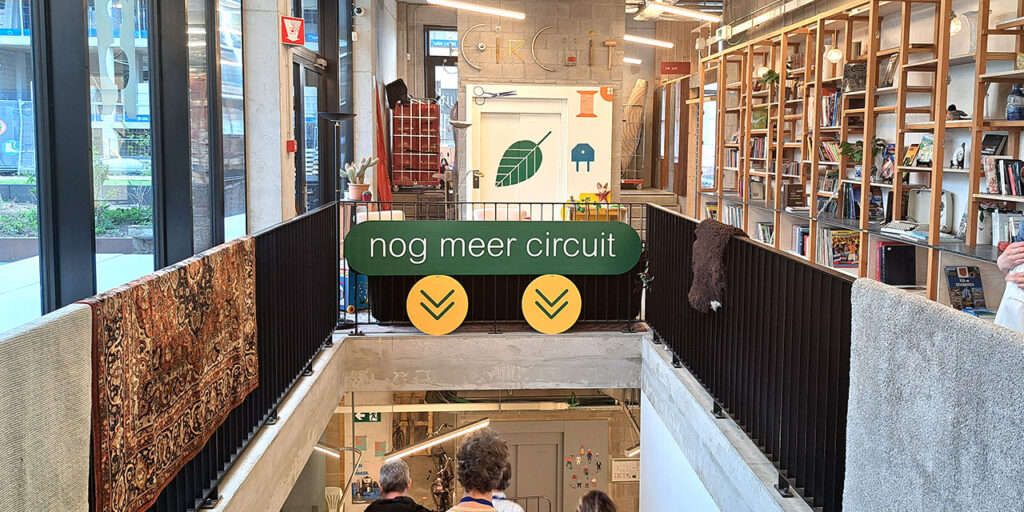
Refaced – second-hand eyeglass frames
Refaced is the pioneering second-hand glasses store, the first in Belgium, located in Circuit circular experience centre since October 2023. Refaced focuses on reuse and social employment, and it is led by Mr Koen Van Pottelbergh, also known as ‘The Glasses Man’. (BAS 2023.)
In collaboration with Ecoso, an NGO, and Yuma Labs, a circular eyewear design and production agency, Refaced offers a new life to old frames. Unused eyeglasses are collected in several collection points in a cardboard box, and then refurbished, and sold at affordable prices. Ecoso oversees frame’s repair and cleaning with employees who are at a distance from the labor market, thus receiving guidance and coaching. Refaced offers these refurbished frames for €20, with customized lenses available for an additional €40. Yuma Labs specializes in recycling damaged glasses into new eyewear. (BAS 2023; Van Pottelbergh 2024.)
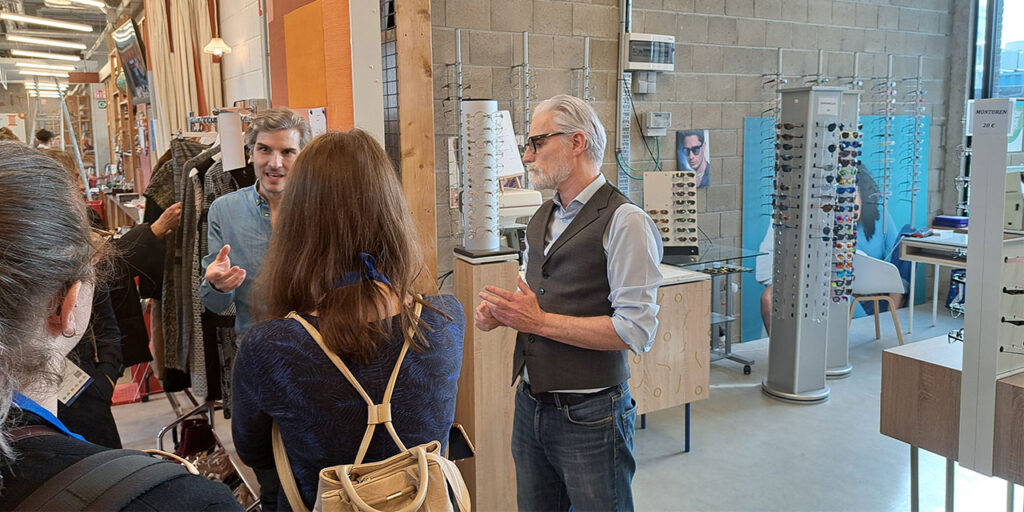
During the site visit, Mr. Van Pottelbergh detailed the journey of developing self-adjustable glasses tailored for children aged 12 to 18. The initial design featured small flute-like mechanism on either side of the frame. It was filled with Dow Corning optical silicone fluid between the lenses, allowing for positive and negative lens adjustments, inspired by Professor Joshua Silver’s earlier invention. Due to the delicate nature of the mechanism, the flutes were not long-lasting. In collaboration with a Dutch designer, a more durable model was developed, replacing the flutes with rolling wheels embedded on top of the frame. However, the thickness of the lenses made the appearance unpleasant, so children felt embarrassed wearing them. To make the glasses cheap and good looking, he focused on symmetric glasses, where just one mold to cut lenses is required. Another element was to ensure an ease lens replacement by snapping suitable strength lenses into place. (Van Pottelbergh 2024.)
Conclusions
Circular economy hubs act as incubators for new sustainable business practices. Hubs foster community engagement, cooperation, and innovation to optimize resources resulting in environmentally and socially responsible products. Items like clothing, bikes, and furniture are increasingly being circulated through these hubs. However, sectors such as eyewear still require forerunners for a wider adoption. The development of self-adjustable glasses illustrates the importance of circular design and collaboration in making sustainability a practical reality.
Author
Katerina Medkova works as an RDI Specialist at LAB University of Applied Sciences and is CITISYSTEM Project Manager.
References
BAS. 2023. Refaced verkoopt tweedehandsbrillen op Nieuw Zuid. Cited 13 Apr 2024. Available at https://www.buurtaandestroom.be/lifestyle/refaced-verkoopt-tweedehandsbrillen-op-nieuw-zuid/#gref
Finnish Association of Vision and Eyecare. 2022. The continuous use of eyeglasses has increased in all age groups – Optometrists meet the needs of an aging population. Cited 13 Apr 2024. Available at https://naery.fi/en/2022/12/16/the-continuous-use-of-eyeglasses-has-increased-in-all-age-groups-opticians-meet-the-needs-of-an-aging-population/#:~:text=Eye%20healthcare%20in%20Finland,increased%2C%20especially%20among%20young%20people
Sadovsky, G. 2023. Eyewear Industry Statistics and Facts 2023. Overnight Glasses. Cited 13 Apr 2024. Available at https://www.overnightglasses.com/eyewear-industry-statistics/
TeachersCollegesj. 2019. How many eyeglasses are thrown away each year? Cited 13 Apr 2024. Available at How many eyeglasses are thrown away each year? – TeachersCollegesj
Van Pottelbergh, K. 2024. Refaced. Oral presentation given during the Go green and dive into sustainable Antwerp site visit in Circuit on 20 Mar 2024, Antwerp.
Links
Link 1. Circuit. 2024. About. Cited 14 Apr 2024. Available at https://circuitantwerpen.be/en/about

